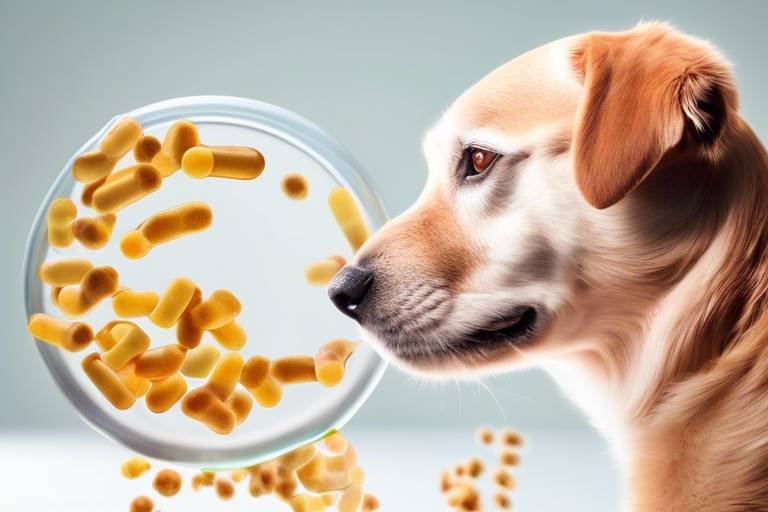Signs Your Pet Needs to See a Specialist
As pet owners, we all want our furry companions to live happy and healthy lives. However, sometimes our pets can't tell us when something is wrong. This is where being vigilant and observant comes into play. Recognizing the signs that your pet may need to see a specialist is crucial for their health and well-being. Just like humans, pets can experience a variety of health issues that may require specialized care. Whether it’s a sudden change in behavior or a persistent health problem, understanding these signs can help ensure your pet gets the best possible treatment. Let’s dive into some of the most common indicators that your beloved pet might need a little extra help!
Weight loss in pets can be a serious issue, often indicating underlying health problems. If your pet is shedding pounds without any change in diet or exercise, it could be a red flag. There are numerous potential causes for this weight loss, including metabolic disorders, dental issues, or even cancer. It’s essential to consult a specialist if you notice a significant change in your pet’s weight. Early intervention can make all the difference in treatment outcomes, so don’t hesitate to seek help!
Chronic vomiting or diarrhea can lead to dehydration and other complications that can be life-threatening. If your pet experiences these symptoms for more than 24 hours, it’s time to consult a specialist. These issues can stem from various causes, including infections, parasites, or food intolerances. The longer these symptoms persist, the more serious the underlying issue may become. So, keep an eye on your pet’s bathroom habits and don’t ignore the signs!
Behavioral changes in pets can be alarming. If your usually friendly dog suddenly becomes aggressive, or your cat who loves to play becomes lethargic, it may signal health issues. Animals often hide their discomfort, so changes in behavior can be one of the first signs that something is wrong. Observing these changes closely and discussing them with a specialist can lead to quicker diagnosis and treatment. Remember, your pet’s behavior is their way of communicating with you!
Respiratory issues in pets can be life-threatening. Signs such as coughing, wheezing, or labored breathing should never be overlooked. If you notice your pet struggling to catch their breath or if they seem unusually tired after minimal activity, it’s crucial to seek immediate specialist attention. Conditions like asthma or heart problems can escalate quickly, so don’t wait to get your pet the care they need.
Persistent skin issues, such as itching or rashes, can indicate allergies or infections. If your pet is scratching excessively or has developed red patches on their skin, it might be time to consult a veterinary dermatologist. These specialists can provide targeted treatments and help alleviate your pet's discomfort. Remember, skin problems can often be symptomatic of more significant health issues, so it’s best to address them early on.
Joint pain can severely affect your pet's quality of life. If you notice your pet is reluctant to jump, play, or even walk, they may be suffering from arthritis or another joint condition. Observing your pet’s mobility is essential. If they seem stiff after resting or have difficulty getting up, it’s time to see a specialist. They can provide a proper diagnosis and recommend treatments that can help improve your pet's mobility and comfort.
Frequent ear infections can lead to serious complications if left untreated. If your pet is shaking their head, scratching at their ears, or has a foul smell coming from their ears, it’s essential to consult a specialist. Ear problems can stem from allergies, parasites, or other underlying conditions. Addressing these issues promptly can prevent more severe health problems down the line.
Dental health is crucial for your pet's overall well-being. Signs of dental issues include bad breath, difficulty eating, or visible tartar buildup. If you notice any of these symptoms, it’s important to consult a veterinary dentist. Neglecting dental problems can lead to severe health issues, including heart disease, so don’t wait until it’s too late to seek help!
Finding lumps or growths on your pet can be concerning. Not all growths are cancerous, but it’s essential to have any unusual growths evaluated by a specialist promptly. Early detection can lead to more effective treatment options. If you notice a lump that seems to change in size or shape, don’t hesitate to get it checked out!
- How do I know if my pet needs to see a specialist? Look for signs such as unexplained weight loss, persistent vomiting, or changes in behavior.
- What types of specialists are available for pets? There are various specialists, including veterinary dermatologists, dentists, and orthopedic surgeons.
- How can I prepare for my pet's specialist appointment? Bring any medical records, a list of symptoms, and questions you may have to ensure a productive visit.

Unexplained Weight Loss
Weight loss in pets can be a serious issue, often indicating underlying health problems that could range from minor to life-threatening. When your furry friend starts shedding pounds without any changes in diet or activity level, it’s time to take notice. Just like when we humans experience sudden weight loss, it can be a red flag that something isn’t quite right. Imagine your pet as a car; if it starts sputtering or losing power, you wouldn’t ignore those signs, right? Similarly, your pet’s unexplained weight loss deserves immediate attention.
There are numerous potential causes for weight loss in pets, including:
- Medical Conditions: Diseases such as diabetes, kidney disease, or hyperthyroidism can lead to weight loss.
- Dental Issues: If your pet is experiencing pain while eating due to dental problems, they may avoid food, resulting in weight loss.
- Parasites: Intestinal worms or other parasites can rob your pet of nutrients, leading to weight loss.
- Stress or Anxiety: Just like humans, pets can lose their appetite due to stress or changes in their environment.
It’s essential to monitor your pet’s weight regularly. If you notice a significant change, don't hesitate to consult a specialist. A veterinarian can perform a thorough examination and run tests to determine the cause of the weight loss. Early intervention can make a world of difference in treatment outcomes. Remember, just as you would seek a specialist for your health concerns, your pet deserves the same level of care.
In summary, unexplained weight loss is not just a cosmetic issue; it can signify serious health problems that require immediate attention. By being proactive and observant, you can help ensure your pet maintains a healthy weight and overall well-being.

Persistent Vomiting or Diarrhea
Persistent vomiting or diarrhea in your pet is not just a minor inconvenience; it can be a serious health concern that requires immediate attention. If your furry friend is experiencing these symptoms frequently, it's essential to recognize that they could lead to severe dehydration and other complications. Imagine your pet's body as a delicate balance of water and nutrients; when that balance is disrupted by constant vomiting or diarrhea, it can quickly spiral into a crisis. So, what should you look out for?
First, consider the frequency and duration of the symptoms. If your pet has vomited or had diarrhea more than twice in a 24-hour period, it's time to take action. Additionally, pay attention to the consistency of the vomit or stools. Are they watery? Are there any unusual colors or odors? These details can provide valuable insights into your pet's health. For instance, if you notice blood in the vomit or stool, this is a red flag that necessitates immediate veterinary care.
Moreover, persistent vomiting or diarrhea can stem from a variety of underlying causes. These may include:
- Infections: Bacterial, viral, or parasitic infections can wreak havoc on your pet's digestive system.
- Dietary indiscretion: Pets are notorious for eating things they shouldn't, leading to gastrointestinal upset.
- Food allergies: Just like humans, pets can develop allergies to certain ingredients in their food.
- Underlying medical conditions: Issues such as pancreatitis, kidney disease, or liver problems can manifest as digestive disturbances.
So, when should you consult a specialist? If your pet's vomiting or diarrhea persists for more than 24 hours, or if you observe any additional symptoms such as lethargy, loss of appetite, or abdominal pain, it's crucial to seek a veterinary specialist's opinion. They can perform a thorough examination and may recommend diagnostic tests like blood work or imaging studies to pinpoint the issue. Early intervention is key to preventing more serious health complications.
In summary, while occasional vomiting or diarrhea can happen to any pet, persistent symptoms should not be ignored. Your pet relies on you to recognize when something is off and to take the necessary steps to ensure their health and well-being. So, keep an eye on those little signs and don't hesitate to reach out to a specialist if you have concerns. After all, a happy pet is a healthy pet!
- What should I do if my pet is vomiting or has diarrhea?
Monitor their symptoms closely and consult a veterinarian if the symptoms persist for more than 24 hours or if you notice additional concerning signs. - Can I treat my pet's vomiting or diarrhea at home?
While some mild cases can be managed at home with dietary adjustments, it's always best to consult a veterinarian to rule out serious conditions. - What are the signs of dehydration in pets?
Signs include dry gums, excessive thirst, lethargy, and loss of skin elasticity. If you notice these signs, seek veterinary care immediately.

Changes in Behavior
When it comes to our furry companions, their behavior can often speak volumes about their health. Just like humans, pets can experience emotional and physical changes that may indicate underlying issues. Have you ever noticed your once playful puppy suddenly becoming a couch potato? Or perhaps your gentle cat has started hissing at everyone? These behavioral changes can be subtle yet significant, and they shouldn't be ignored. It’s essential to recognize that changes in behavior can be a cry for help from your pet, signaling that something isn't quite right.
Behavioral issues can manifest in various ways, including:
- Increased Aggression: If your pet, who was once friendly, suddenly becomes aggressive towards people or other animals, it could indicate pain or discomfort.
- Lethargy: A noticeable drop in energy levels, where your pet seems disinterested in activities they once loved, can be a red flag.
- Excessive Vocalization: If your pet starts to vocalize more than usual, it might be trying to communicate distress or discomfort.
- Changes in Eating or Drinking Habits: A sudden increase or decrease in appetite can also indicate health issues.
These signs can often be linked to a variety of health problems ranging from chronic pain to neurological disorders. For instance, a pet that is experiencing pain may become aggressive as a defensive mechanism. Similarly, a pet that feels unwell may withdraw and show less interest in play or social interaction. Recognizing these changes early can lead to quicker diagnoses and treatment, ultimately improving your pet's quality of life.
So, what should you do if you notice these changes? It's crucial to consult a specialist who can conduct a thorough examination and provide the necessary tests. A veterinary behaviorist or a specialist in internal medicine may be able to offer insights that your regular vet might not. Remember, the sooner you seek help, the better the chances of addressing the underlying issues effectively.
In summary, paying attention to your pet's behavior is key to ensuring their health and happiness. If you observe any shifts in their usual demeanor, don't hesitate to take action. Your furry friend relies on you to be their voice and advocate, so be proactive and seek specialized care when necessary.
- What should I do if my pet shows sudden aggression? It's best to consult a veterinarian or a pet behaviorist to determine the underlying cause and appropriate treatment.
- How can I tell if my pet is lethargic? If your pet is less active than usual, does not engage in play, or seems to sleep more than normal, it's time to seek professional advice.
- Are behavioral changes always health-related? Not necessarily, but it’s important to rule out any health issues before attributing changes to behavioral problems.

Difficulty Breathing
When it comes to our beloved pets, their well-being is our top priority. One of the most alarming signs that something may be wrong is difficulties in breathing. Just like us, pets can experience a range of respiratory issues that can be life-threatening if not addressed promptly. If you notice your furry friend is breathing harder than usual, has a persistent cough, or is exhibiting labored breathing, it’s crucial to take action. These symptoms can indicate a variety of conditions, from allergies and infections to more severe issues such as heart disease or lung problems.
Imagine your pet struggling to catch their breath, much like a fish out of water. It’s a distressing sight that no pet owner wants to witness. Some common signs to look out for include:
- Rapid Breathing: If your pet is panting excessively or their abdomen is moving in and out rapidly, it could be a sign of respiratory distress.
- Coughing: A persistent cough, especially if it sounds harsh or honking, should not be ignored.
- Blue-tinged Gums: If you notice a bluish tint to your pet's gums or tongue, this indicates a lack of oxygen and requires immediate attention.
- Open-Mouth Breathing: Dogs may breathe with their mouths open when they’re hot or stressed, but if this becomes a regular occurrence, it’s time to consult a specialist.
Just like humans, pets can suffer from conditions such as asthma, pneumonia, or even heartworm disease. These issues can escalate quickly, so it’s essential to be vigilant. If your pet is exhibiting any of these signs, don’t wait! Contact a veterinary specialist who can conduct a thorough examination, including diagnostic tests such as X-rays or blood work, to determine the underlying cause of the breathing difficulties.
In the meantime, ensure your pet is in a calm environment, as stress can exacerbate breathing issues. Sometimes, just like we need a little fresh air, your pet might benefit from a quiet space away from noise and chaos. Remember, the sooner you seek help, the better the chances of a positive outcome for your furry companion.
Here are some common questions pet owners have regarding their pets' breathing difficulties:
- What should I do if my pet is having trouble breathing? Seek veterinary care immediately. Breathing difficulties can escalate quickly.
- Can anxiety cause breathing problems in pets? Yes, anxiety can lead to rapid breathing or panting, but it’s vital to rule out medical causes first.
- How can I help my pet breathe easier at home? Keep them calm, avoid strenuous activity, and ensure they have a comfortable environment.

Skin Problems
When it comes to our furry companions, are among the most common issues that pet owners encounter. If you notice your pet scratching, biting, or licking their skin more than usual, it could be a sign of an underlying condition that needs specialized attention. Skin issues can manifest in various ways, from itchy rashes to hair loss, and can be caused by a multitude of factors including allergies, infections, or even parasites. It's crucial to understand that while some skin problems may seem minor, they can lead to more severe health complications if left untreated.
One of the most frequent culprits behind skin problems in pets is allergies. Just like humans, pets can have allergic reactions to certain foods, environmental factors like pollen or dust mites, or even flea bites. If your pet is experiencing any of the following symptoms, it might be time to consult a veterinary dermatologist:
- Excessive scratching or biting: This can lead to open wounds and secondary infections.
- Red or inflamed skin: This is often a clear indicator of irritation or infection.
- Foul odor: If your pet has a noticeable smell coming from their skin or ears, it could indicate an infection.
- Hair loss: Patches of missing fur can signify a range of issues from allergies to hormonal imbalances.
Another common issue is dermatitis, which can be caused by various irritants or allergens. This condition can lead to inflammation and discomfort, making your pet unhappy and restless. In some cases, skin problems can also be a sign of more serious internal issues, such as hormonal disorders or autoimmune diseases. Therefore, if you observe persistent skin problems, it’s essential to seek the help of a specialist who can provide a thorough examination and appropriate treatment options.
In addition to seeking veterinary care, there are several steps you can take at home to help manage your pet's skin health. Regular grooming is not just about keeping your pet looking good; it also helps to identify any skin issues early on. Bathing your pet with hypoallergenic shampoos can help soothe irritated skin and remove allergens. Furthermore, maintaining a balanced diet rich in omega fatty acids can promote healthy skin and a shiny coat. However, always consult your veterinarian before introducing any new products or dietary changes.
In conclusion, while skin problems can be a common occurrence in pets, it’s vital to pay close attention to any changes in their skin condition. Early intervention can make a significant difference in your pet's health and comfort. If your pet is showing signs of skin problems, don’t hesitate to reach out to a specialist who can provide the necessary care and treatment.
Q: How can I tell if my pet has a skin allergy?
A: Look for signs such as excessive scratching, biting, or licking, along with red or inflamed skin. Consulting a vet is the best way to determine the cause.
Q: Are there home remedies for pet skin issues?
A: While some home remedies can help soothe mild irritations, it's essential to consult a vet for proper diagnosis and treatment, especially if symptoms persist.
Q: How often should I groom my pet to prevent skin problems?
A: Regular grooming should be done at least once a week, but pets with longer fur may require more frequent grooming.

Joint Pain and Mobility Issues
As pet owners, we often notice our furry friends running around with boundless energy, chasing after balls, or simply enjoying a good romp in the park. However, when your pet starts to show signs of joint pain or mobility issues, it can be a heart-wrenching experience. Imagine if you suddenly found it hard to walk or climb stairs; that’s what your pet might be feeling. Joint pain can severely affect your pet's quality of life, making it crucial to recognize the signs early on.
One of the most common indicators of joint pain is a noticeable change in your pet's activity level. If your once playful pup is now reluctant to jump onto the couch or your cat is avoiding the stairs altogether, these could be red flags. Other signs include limping, stiffness after rest, or difficulty getting up after lying down. It’s almost like watching a beloved family member struggle with everyday tasks, and it’s vital to take these symptoms seriously.
There are several potential causes of joint pain in pets, including arthritis, hip dysplasia, or even past injuries that didn’t heal properly. Older pets are particularly susceptible to these conditions, but younger pets can also suffer from congenital issues. It’s essential to consult a specialist who can provide a proper diagnosis and treatment plan tailored to your pet’s specific needs.
When you take your pet to a specialist, they may recommend a variety of diagnostic tests, such as X-rays or blood tests, to determine the underlying cause of the pain. Based on the results, treatment options may include:
- Medications: Anti-inflammatory drugs or pain relief medications can significantly improve your pet’s comfort.
- Physical Therapy: Just like humans, pets can benefit from physical therapy to strengthen muscles and improve mobility.
- Weight Management: Keeping your pet at a healthy weight can alleviate pressure on their joints.
- Joint Supplements: Supplements like glucosamine and chondroitin can help support joint health.
In some cases, surgical options may be necessary, especially if your pet has severe joint damage. The thought of surgery can be daunting, but it’s important to remember that these procedures can significantly enhance your pet’s quality of life, allowing them to return to their playful selves.
As a pet owner, being proactive about your pet's joint health is key. Regular check-ups with your veterinarian can help catch issues early before they escalate. Furthermore, providing a comfortable living environment with soft bedding and easy access to food and water can make a world of difference for a pet suffering from joint pain.
In conclusion, if you notice any signs of joint pain or mobility issues in your beloved pet, don't wait for the symptoms to worsen. Seek the advice of a veterinary specialist who can guide you through the process of diagnosis and treatment. Remember, your pet relies on you to advocate for their health and well-being.
Q: How can I tell if my pet is in pain?
A: Signs of pain in pets can include changes in behavior, reluctance to move, whimpering, or changes in appetite. If you notice any of these signs, it’s best to consult a veterinarian.
Q: Are there any home remedies for joint pain in pets?
A: While some home remedies, like warm compresses or gentle massage, can provide temporary relief, it’s important to consult a veterinarian for a proper diagnosis and treatment plan.
Q: Can joint pain be prevented?
A: Maintaining a healthy weight, providing regular exercise, and ensuring a balanced diet can help prevent joint issues in pets.

Ear Infections
Ear infections in pets are more common than you might think, and they can be a real pain—literally! Just like us, our furry friends can experience discomfort that can lead to serious health issues if left unchecked. If you notice your pet shaking their head excessively, scratching at their ears, or showing signs of irritation, it might be time to take a closer look. These symptoms are often the first signs of an ear infection, which can be caused by a variety of factors including allergies, bacteria, yeast, or even foreign objects lodged in the ear canal.
Ignoring these signs can lead to complications, including chronic infections or even hearing loss. Just imagine how frustrating it must be for your pet to deal with constant itching and discomfort! The ear canal is a sensitive area, and issues here can escalate quickly. If you find yourself in this situation, it's crucial to consult a veterinary specialist who can provide a thorough examination and appropriate treatment.
So, what are some common symptoms of ear infections in pets? Here’s a quick rundown:
- Head shaking or tilting
- Scratching or rubbing at the ears
- Odor coming from the ear
- Redness or swelling in the ear canal
- Discharge that may be yellow, brown, or black
Each of these symptoms can indicate that your pet is struggling with an infection that needs immediate attention. It's essential to act quickly, as untreated ear infections can lead to more severe issues, such as ruptured eardrums or chronic ear problems. The longer you wait, the more complicated the treatment may become.
When you visit a specialist, they will likely perform a few diagnostic tests to determine the exact cause of the infection. This may include examining the ear canal with an otoscope, taking samples of any discharge, or even conducting allergy tests if they suspect that allergies are the root cause. Based on their findings, they can recommend a tailored treatment plan that may involve cleaning the ears, prescribing medication, or suggesting dietary changes.
In summary, if your pet is showing signs of an ear infection, don’t hesitate to seek help. The sooner you address the issue, the better the outcome for your furry companion. Remember, a happy pet is a healthy pet, and keeping their ears clean and free from infection is a vital part of their overall well-being.
Q: How can I prevent ear infections in my pet?
A: Regular ear cleaning with vet-approved solutions and keeping your pet's ears dry after baths or swimming can help prevent infections.
Q: Are certain breeds more prone to ear infections?
A: Yes, breeds with floppy ears, such as Cocker Spaniels and Basset Hounds, are more susceptible to ear infections due to reduced airflow in the ear canal.
Q: What should I do if my pet has an ear infection?
A: Consult a veterinary specialist as soon as possible for a proper diagnosis and treatment plan.

Dental Problems
Dental health is often an overlooked aspect of pet care, yet it plays a crucial role in your furry friend’s overall well-being. Just like humans, pets can suffer from a variety of dental issues that can lead to pain, infection, and even more serious health problems if left untreated. Imagine trying to enjoy your favorite meal with a toothache—your pet experiences similar discomfort when dealing with dental problems. It's essential to recognize the signs of these issues early on to ensure your pet remains happy and healthy.
One of the most common indicators of dental issues in pets is bad breath. While a little pet breath can be expected, a sudden change to a foul odor might signal dental disease or infection. Other signs to watch for include:
- Difficulty eating or chewing
- Excessive drooling
- Red or swollen gums
- Loose or missing teeth
- Behavioral changes, such as irritability when you touch their mouth
If you notice any of these symptoms, it’s crucial to consult a veterinary dentist. They can perform a thorough examination and recommend appropriate treatment options. Treatments may range from professional dental cleanings to more invasive procedures such as tooth extractions, depending on the severity of the issue.
To help you better understand the importance of dental care, consider this table outlining common dental problems and their potential consequences:
| Dental Problem | Potential Consequences |
|---|---|
| Periodontal Disease | Can lead to tooth loss, pain, and systemic infections affecting vital organs. |
| Tooth Fractures | May cause severe pain and require extraction or root canal treatment. |
| Oral Tumors | Can be benign or malignant; early detection is crucial for treatment options. |
| Tooth Decay | Can lead to infections and abscesses, requiring more extensive dental work. |
Regular dental check-ups are essential in preventing these issues. Just like we visit the dentist every six months, your pet should have routine dental examinations. These visits allow veterinarians to catch problems early and provide preventative care, such as professional cleanings or advice on at-home dental care.
In addition to professional care, there are several things you can do at home to maintain your pet's dental health:
- Brush your pet's teeth regularly with toothpaste designed for pets.
- Provide dental chews or toys that promote oral health.
- Feed a balanced diet that supports dental health.
In conclusion, don’t underestimate the importance of dental health for your pet. Regular check-ups, awareness of symptoms, and proactive care can help prevent painful conditions and ensure a longer, healthier life for your beloved companion. If you suspect your pet has dental problems, don’t delay in seeking the advice of a veterinary specialist. Your pet deserves the best care possible!
Q: How often should I take my pet to the vet for dental check-ups?
A: It's recommended to have your pet's teeth checked at least once a year, but more frequent visits may be necessary for pets with existing dental issues.
Q: Can I use human toothpaste for my pet?
A: No, human toothpaste contains ingredients that can be harmful to pets. Always use toothpaste specifically formulated for pets.
Q: What are the signs that my pet may need dental treatment?
A: Signs include bad breath, difficulty eating, excessive drooling, red or swollen gums, and loose teeth. If you notice any of these, consult a veterinarian.
Q: Are dental cleanings safe for pets?
A: Yes, professional dental cleanings are generally safe and are performed under anesthesia to ensure your pet's comfort and safety.

Unusual Growths or Lumps
This article will explore the various indicators that suggest your pet may require specialized veterinary care. Understanding these signs can help ensure your furry friend receives the best possible treatment.
Finding on your pet can be one of the most alarming experiences for a pet owner. You might think, "What on earth is that?" and your mind races with possibilities. While not all lumps are dangerous, some can indicate serious health issues, including tumors or infections. It's essential to take a closer look at these growths and understand when it's time to consult a specialist.
First, let’s consider the types of lumps you might encounter. They can vary widely in size, shape, and texture. Some common types include:
- Benign tumors: These growths are non-cancerous and typically pose little threat to your pet's health.
- Malignant tumors: These are cancerous and require immediate attention.
- Cysts: Fluid-filled sacs that can form under the skin; while often harmless, some may require removal.
- Abscesses: These can occur due to infections and may need to be drained.
Now, you may wonder, "How do I know if a growth is serious?" Here are some signs to look for:
- If the lump changes in size or shape.
- If it's painful to the touch or seems to bother your pet.
- If your pet shows signs of discomfort, such as excessive licking or scratching at the area.
- If the lump is accompanied by other symptoms like fever, lethargy, or loss of appetite.
It's crucial not to ignore these signs. When in doubt, always err on the side of caution and consult a veterinary specialist. They can perform a thorough examination, which may include a fine needle aspiration or a biopsy, to determine the nature of the growth. Early detection can be the key to successful treatment, especially in cases of cancer.
In addition to physical examinations, specialists may recommend imaging tests such as X-rays or ultrasounds to gain a clearer understanding of what’s happening beneath the surface. The earlier you act, the better the chances are for your pet to receive effective treatment, ensuring they remain healthy and happy.
In summary, while finding a lump on your pet can be frightening, understanding the potential implications and knowing when to seek help can make all the difference. Don’t hesitate to reach out to a specialist if you notice anything unusual. After all, your pet relies on you to keep them safe and healthy!
Q: What should I do if I find a lump on my pet?
A: The first step is to remain calm. Monitor the lump for any changes in size, shape, or behavior of your pet. If you notice any concerning signs, contact your veterinarian or a specialist for a thorough evaluation.
Q: Are all lumps on pets dangerous?
A: Not all lumps are dangerous. Some may be benign or harmless cysts. However, it’s important to have any new or changing lumps evaluated by a veterinarian to rule out serious conditions.
Q: How will a vet determine if a lump is cancerous?
A: A veterinarian may perform a physical exam, followed by diagnostic tests such as fine needle aspiration, biopsies, X-rays, or ultrasounds to determine the nature of the lump.
Q: What are the treatment options for lumps or growths?
A: Treatment varies depending on the diagnosis. Options may include monitoring, surgical removal, or medical treatment such as chemotherapy for malignant tumors.
Q: How often should I check my pet for lumps?
A: Regularly check your pet’s body during grooming or petting sessions. It’s a good habit to keep an eye out for any changes, as early detection is crucial.
Frequently Asked Questions
- What should I do if my pet is losing weight unexpectedly?
If your pet is experiencing unexplained weight loss, it's crucial to consult a veterinary specialist. Weight loss can indicate serious health issues, such as metabolic disorders or organ dysfunction. Early intervention can make a significant difference in your pet's health.
- How long is too long for my pet to vomit or have diarrhea?
Persistent vomiting or diarrhea lasting more than 24 hours is a red flag. It can lead to dehydration and other complications. If your pet shows these symptoms, especially combined with lethargy or loss of appetite, it's time to see a specialist.
- What behavioral changes in pets should I be concerned about?
Any sudden changes in your pet's behavior, such as increased aggression, withdrawal, or excessive lethargy, can be signs of underlying health issues. Consulting a specialist can help determine if these changes are due to physical or psychological factors.
- What are the signs that my pet is having difficulty breathing?
Signs of respiratory distress in pets include rapid breathing, coughing, wheezing, or gasping for air. If you notice any of these symptoms, seek immediate attention from a veterinary specialist, as breathing difficulties can be life-threatening.
- When should I take my pet to a dermatologist?
If your pet is experiencing persistent skin issues, such as itching, rashes, or hair loss, it's advisable to consult a veterinary dermatologist. These specialists can diagnose allergies, infections, or other dermatological conditions that may be affecting your pet's skin health.
- How can I tell if my pet is experiencing joint pain?
Signs of joint pain in pets can include limping, reluctance to jump or climb stairs, and changes in activity levels. If you suspect your pet is having mobility issues, a specialist can provide a thorough examination and recommend appropriate treatment options.
- What should I do if my pet has frequent ear infections?
Frequent ear infections can indicate underlying issues such as allergies or anatomical problems. It's essential to consult a veterinary specialist to determine the cause and receive appropriate treatment to prevent complications.
- How important is dental health for my pet?
Dental health is vital for your pet's overall well-being. Signs of dental problems include bad breath, difficulty eating, and swollen gums. If you notice any of these signs, consider consulting a veterinary dentist for a thorough evaluation and treatment.
- What should I do if I find a lump or growth on my pet?
If you discover any unusual growths or lumps on your pet, it's important to have them evaluated by a specialist promptly. While some lumps may be benign, others could indicate serious health concerns that require immediate attention.



















